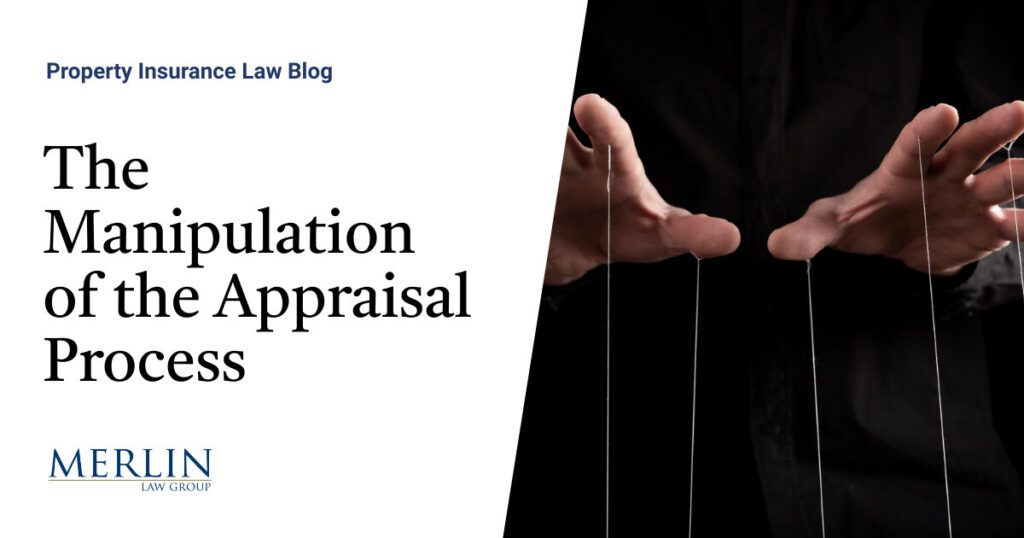The Manipulation of the Appraisal Process

An appraisal can be an excellent way to resolve an “amount of loss” dispute between an insurer and a policyholder. It is intended to be a neutral and independent process, and that is what makes appraisal a potentially great option, in theory, when handled correctly. But first, for any readers who may not already know what an appraisal is in the context of a property insurance claim, allow me to offer a little framework.
Generally speaking, an appraisal is a process where the insurer appoints an appraiser, the policyholder appoints an appraiser, and an umpire is selected to resolve any issues that the two appraisers cannot agree upon. An appraisal award only requires two of the three signatures to be valid and binding. Appraisal is intended to be a cost-efficient and time-efficient manner of resolving an “amount of loss” dispute. Appraisal is designed to determine the “amount of loss” only and is never a tool to determine questions of coverage. What is an “amount of loss” dispute? It is generally understood to involve the scope of repairs necessary to return covered property to its pre-loss condition and the cost of such necessary repairs. Appraisers generally must first determine the extent of damage from the cause of loss in order to form an opinion on the scope of repairs necessary to repair the damage.
Unfortunately, several tactics have been employed by insurance companies to influence the appraisal process. The neutral and independent nature of the appraisal process is what makes it a good tool for resolving disputes—so it is easy to see why improperly influencing the appraisal process is problematic. After all, the basic concept behind appraisal is to remove both the insurer and the policyholder from the equation by inserting a neutral and independent appraisal panel—a group of individuals with nothing to gain or lose from the outcome of the claim—with the task of determining the amount of loss.
Sounds fair, right? It should be, but unfortunately, there are insurers who seek to undermine the neutral and independent spirit of appraisal to gain an unfair advantage. Now, I am not suggesting that there aren’t individuals on both sides who attempt to influence the process. As a policyholder attorney, I believe we must self-police and actively protect the spirit of appraisal. I would invite our friends on the other side to self-police as well, but that does not always happen, so we must be aware of current trends so that we can effectively represent policyholders. Below are several ways in which insurers attempt to influence and undermine the neutral and independent spirit of the appraisal process:
Control Over Appraisers: Insurance companies often dictate what their appointed appraisers can and cannot do. I have handled cases where an insurer’s appraiser clearly communicated to our client’s appraiser that he was in agreement with the proposed appraisal award, but he could not sign off on it officially until approval was given by the insurer’s inside desk adjuster. How is the appraisal neutral and independent when an appraiser must go back to the insurer for permission to do what he believes is correct? If the insurer’s appraiser was truly neutral and independent, then he would not need to go back for permission to do his job.
This undermines the fundamental neutral and independent nature of the process, where both the insurer and the policyholder should step aside after naming their appraisers, allowing the appraisal panel to independently evaluate and resolve issues.
Influence Over Umpire Selection: Insurers will sometimes provide their chosen appraiser with an insurer-approved list of umpires with the instruction that their appraiser may only agree to use an umpire from that approved umpire list. Remember, an appraisal award only requires two of the three signatures to be valid and binding. Well, the insurer already has two potential favorable signatures if the insurer appoints an appraiser that will follow the insurer’s direction and the insurer successfully controls the selection of an umpire from its approved list. Naturally, the chances of a favorable appraisal decision are increased.
This interference compromises both the neutrality and independence of the insurer’s appraiser and the umpire. An umpire should be chosen jointly by the appraisers, not dictated by either party. Selecting an umpire from an insurance company’s list raises concerns about impartiality and fairness.
Interference During Appraisal: There are cases where insurers restrict the information upon which their chosen appraiser may rely. I have handled cases where an insurer’s appraiser is only allowed to rely upon the expert retained by the insurer and is not allowed to rely upon reports prepared by a policyholder’s expert. This is problematic and a clear attempt to sway the decision of the appraisal panel. Keep in mind that if additional expert opinions are needed, it should be up to the appraisers or umpire to request them. Obtaining a third expert opinion may be a good option to move the ball forward when you have two experts with very different opinions.
In another matter, I had a request from a desk adjuster that we restrict the information made available to the appraisers by not providing them with any estimates. I questioned the logic behind restricting the information. The adjuster stated the estimates would establish a high and low number, and the adjuster told me the number could never be as high as the public adjuster’s estimate. After listening, I reminded the adjuster that the appraisers needed to be provided with all the information and that after receiving all the information, the appraisers would be expected to arrive at their own independent conclusions. After all, isn’t that what appraisal is?
You can easily see that it is difficult for an appraiser to reach a neutral and independent conclusion when the appraiser is prohibited from considering all available information. This undue influence on the process only leads to more contentious appraisals.
If you find yourself in a situation where an opposing appraiser refuses to consider your expert’s opinions and will only rely upon the expert of the insurer’s retained expert, you might consider having the appraisal panel retain a new expert to provide a third opinion. After all, the goal is to get to the truth of the matter. Consider it this way: If you went to two doctors for a medical diagnosis and you received two very different opinions, wouldn’t you want a third opinion to determine what is right?
Post-Award Objections: Some insurers have either changed their policy language to require delineated appraisal awards (where the details of what is covered are explicitly stated). Some insurers have refused to go to appraisal unless the award is delineated, even though the policy language does not require a delineated award. While this might seem like a call for clarity, it often serves as a strategy and additional opportunity for insurers to strike and refuse to pay portions of awards in order to reduce payouts. It is my opinion that you should follow the language of the policy. If the policy requires a delineated appraisal, then any appraisal award should be delineated. If the policy does not require a delineated appraisal, then it should be up to the appraisal panel to determine how they deem best to issue any award.
The Risks of Appraisal for Policyholders
The appraisal process has become a precarious path for policyholders, especially in claims involving larger losses or unsophisticated policyholders who are unaware of the risks. The once-reliable method for resolving disputes now poses substantial risks. Policyholder representatives must recognize that an unfair appraisal award can result in the policyholder being underpaid.
Recent trends show an increase in lawsuits seeking to overturn appraisal awards and to hold members of the appraisal panel accountable. Therefore, it is crucial for policyholders and their representatives to recognize the risks and to navigate these potential pitfalls effectively. You should not hesitate to consult with an attorney if you have concerns. It is generally more efficient to correct problems as they may arise rather than trying to unwind a problem after the process has been completed.
Conclusion
The appraisal process, ideally a fair and independent means of resolving insurance disputes, has been under attack by those who seek an unfair advantage. An appraisal, by its true nature, can be an excellent way to resolve disputes, but you must be careful and understand potential hidden dangers. Engaging legal counsel early can help mitigate these risks and ensure that the appraisal process remains as impartial and effective as intended.



